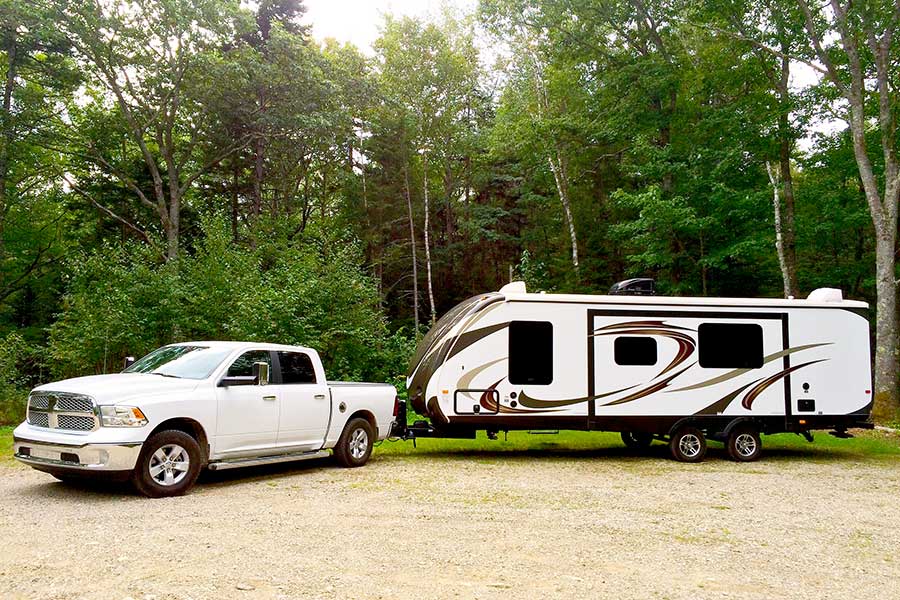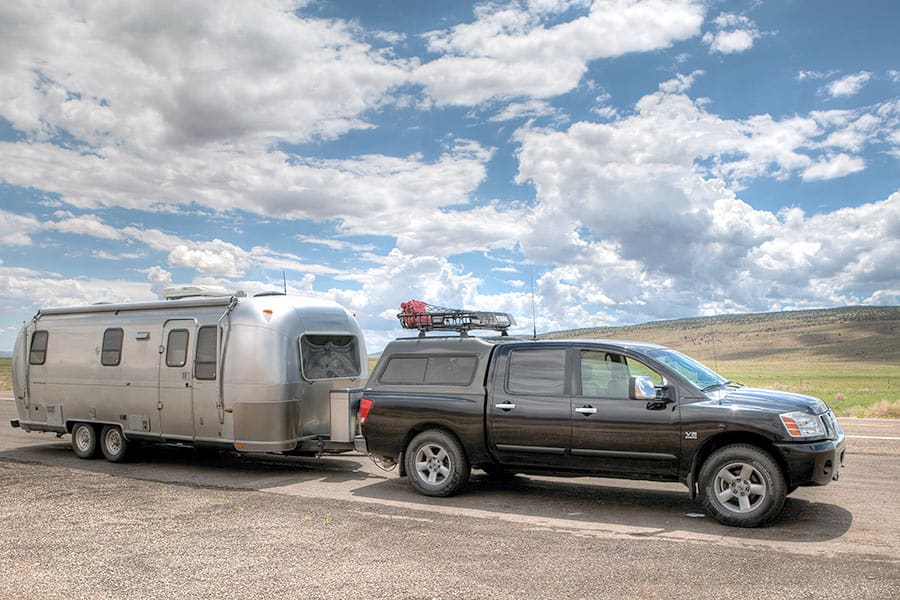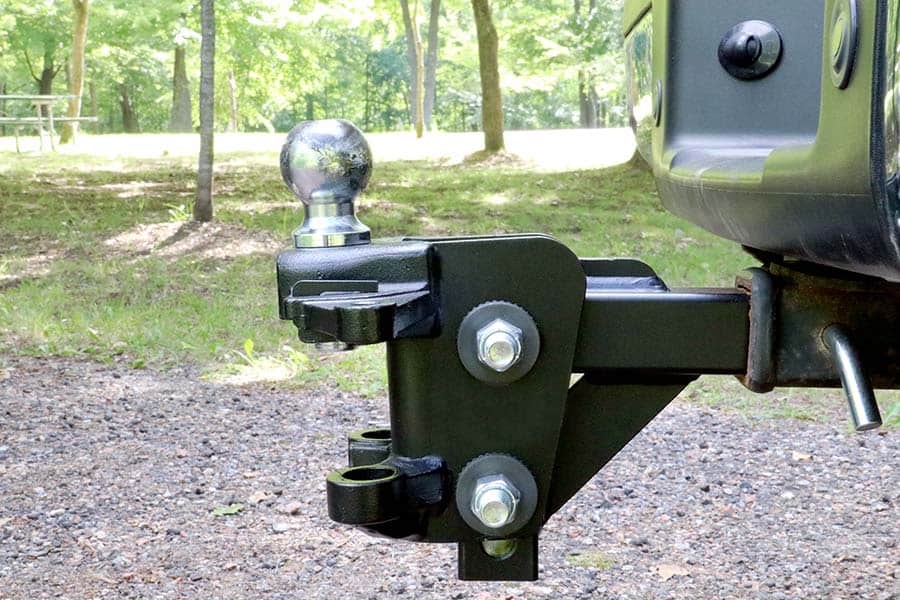
RVing is one of America’s favorite pastimes. Getting out of town and camping in the wilderness or just parking and relaxing at a campground for a few days is a lot of fun. Towing a camping trailer might seem like a simple thing, but how do I determine how much towing capacity I need?
If the vehicle towing capacity is higher than the gross trailer weight, the trailer is safe to tow. Conversely, if the gross trailer weight exceeds the vehicle’s towing capacity, that vehicle should not tow the trailer.
Where Can I Find the Towing Capacity of My Truck?
The towing capacity of your vehicle is usually listed on a placard mounted on the drivers-side door panel. Pop open the driver’s side door and look at the placard that displays your VIN and manufacturer information: the towing capacity should be listed there.
If you don’t see any placards in that location, your next stop should be the owner’s manual. There is likely an entire section on towing, and you should familiarize yourself with their guidelines — it might not be exciting reading. Still, it is good knowledge to have to protect the investment you’ve made in your vehicle.
If you can’t find a towing capacity in either of those locations, you should check the manufacturer’s website or call the manufacturer. It’s not a good idea to just guesstimate your towing capacity.
Be sure you have the towing capacity to pull a trailer safely. Exceeding that capacity may cause undue wear on the vehicle’s engine, transmission, brakes, tires, and other vehicle parts. Therefore, understanding tow capacity is important for choosing the right RV travel trailer. It might seem confusing, but don’t worry. Read on for a better insight into towing and more.
Towing: The Stuff You Need to Know
In general, smaller trailers like pop-ups and teardrops weigh less than 2,500 pounds, and larger fifth-wheel trailers can approach 13,000 pounds or more. Therefore your tow vehicle needs to have the capacity to pull the weight of the specific make and model of your travel trailer.
So what exactly is the towing capacity of a vehicle? The simplest explanation is the maximum amount of weight that your vehicle can safely tow behind it. The towing capacity of any specific vehicle is determined by many factors, including the vehicle’s weight, the engine and axles, and the way the vehicle’s frame is built.
More broadly, towing capacity and weight capacities are broken down into several specific terms that you’ll see listed on vehicles and trailers. Here is a shortlist of the most common terms you’ll encounter when evaluating your towing needs:
- Gross Vehicle Weight Rating (GVWR): This rating is the maximum loaded weight of a vehicle; this includes the vehicle’s curb weight (weight of the vehicle when empty), passengers, cargo, and any accessories you’ve brought with you. To ensure that your vehicle can handle everything, you will need to determine how much your passengers and freight weigh.
- Gross Combined Weight Rating (GCWR): This rating is the maximum combined weight of your vehicle and trailer. And don’t forget it also includes the weight of the people and cargo contained in both vehicles.
- Gross Axle Weight Rating (GAWR): This rating is the maximum distributed weight each axle of a vehicle can handle, including the weight of the people and cargo and the probability of towing a trailer. The rear axle is usually capable of handling more weight.
- Gross Trailer Weight (GTW): This is the total weight of your trailer and its contents, including groceries, hiking gear, bicycles, and anything else you have in the trailer.
- Tongue Weight (TW): This is the downward force (weight) that a trailer exerts on the tow vehicle’s hitch. Ideal tongue weight is between 10-15 percent of the gross trailer weight and should not surpass the vehicle’s towing components rating.
- Curb Weight: This is the weight of a vehicle without any passengers or cargo. It does, however, include gas, oil, and any fluids necessary for proper vehicle operation.
- Payload: This is the greatest amount of weight a vehicle can safely haul, including people and cargo. Manufacturers usually calculate the vehicle’s payload capacity. You can also determine your vehicle’s payload by subtracting the curb weight from the gross vehicle weight rating.
Please note, your vehicle’s specific towing capacity will vary depending on your make, model, engine, trim packages, as well as the inclusion of any special towing packages. Therefore, always check your owner’s manual to verify your towing capacity.
Other Posts of Interest
- How To Choose The PERFECT Mattress For Camping In A Van
- Are Camping Fridges Worth It? These Ones Are!
- What To Look For When Buying Binoculars (+19 Tips To Help You Choose)
- Review: Are Quick-Dry Travel Towels Any Good?
What Determines the Maximum Allowed Towing Capacity of a Truck?
Determining the maximum allowed towing capacity of a vehicle is a complex task involving many variables. Factors like torque and engine horsepower, the maximum weight tolerances of the axles and the frame, and the transmission capabilities all come into play.
To determine the towing capacity, engineers perform dozens of tests. These tests include component-specific tests in laboratories to examine things like how much force it takes to snap a given axle or break the ball off of a tow hitch. Testing continues with models in wind tunnels that evaluate how fluid mechanics will affect the tow vehicle and trailer.
As if that wasn’t enough, towing is demanding on the engine, transmission, and frame. So engineers perform even more tests on these components to evaluate essential questions like whether the transmission will fail while towing a 10,000-pound trailer? Can the vehicle brake effectively with the trailer attached? Does the parking brake work with the trailer?
There’s a lot of data that goes into determining the maximum towing capacity of a vehicle. So this is why it is best to refer to the manufacturer’s weight specifications: they’ve spent a lot of time and money determining exactly how much weight their vehicles can tow. Never exceed the manufacturer’s recommended maximum towing capacity.

Can Exceeding the Towing Capacity of My Truck Cause Damage?
Yes. First of all, exceeding the towing capacity can cause damage to your engine, transmission, and even the frame of your vehicle. In the worst-case scenario, your transmission could fail, or you could damage your engine. Those are expensive problems to fix.
Furthermore, exceeding your towing capacity could seriously alter the handling of your vehicle. For example, you could experience a lot of trailer sway or poor handling when braking your trailer; even if you are moving at a reasonable speed, braking when overweight will wear your brakes out quickly or even cause brake failure.
In short: exceeding your towing capacity is dangerous. So please don’t do it.
Do I Need a Tow Package to Pull a Travel Trailer
That is subject to what someone would consider a tow package, from the essential items listed below to a heavy-duty tow package. Tow packages can vary a lot in terms of equipment and accessories offered.
However, several components are needed to tow a travel trailer safely; a hitch, wiring harness, brake controller, ball mount, and ball. They can be factory-installed when you purchase the vehicle or added later as aftermarket parts. Hitches separate into different classes for different vehicles and towing applications.
Hitch:
- Class 1 hitches are light-duty, with the lowest towing capacity, up to 2,000 pounds gross trailer weight (GTW). Designed for compact cars, small minivans, and crossovers. Perfect for hitch-mounted bike racks, little utility trailers, and small, lightweight teardrop trailers.
- Class 2 hitches are more robust and have a higher towing capacity, with up to 3,500 pounds of gross trailer weight capacity (GTW). As a result, a class 2 hitch is a good choice for SUVs, full-size cars, minivans, crossovers, and light-duty trucks. Suitable for towing pop-up campers, small RV trailers, single-axle utility trailers, hitch-mounted cargo carriers, and bike racks.
- Class 3 hitches are the most common hitch type; they are strong, with a gross trailer weight capacity (GTW) of up to 8,000 pounds. A good choice for SUVs, crossovers, vans, and pickup trucks wanting to tow travel trailers, boats, and landscape trailers.
- Class 4 hitches are designed for heavy load requirements, with up to 10,000 pounds of gross trailer weight capacity (GTW). Primarily used on 1/2-ton thru 1-ton pickups and vans. Perfect for large RV trailers, boats, and dump trailers.
- Class 5 hitches are for extra heavy-duty towing and are usually used in commercial applications. They have a gross trailer weight capacity (GTW) of over 12,000 pounds
Wiring Harness:
If you plan on towing a travel trailer, a wiring harness is required. Most but not all travel trailers have electric brakes; the wiring harness allows the brakes to operate. Also, it will enable all the lights on the trailer to work in coordination with the tow vehicle’s brake lights, turn signals, running lights, etc.
Brake Controller:
You need a brake controller for electric brakes. A brake controller is an electronic device that coordinates braking action between the tow vehicle and the trailer. When applying the brakes in the tow vehicle, the brake controller sends electrical signals to the trailer brakes. The brake controller regulates these signals.
Ball Mount and Ball:
Ball mounts are available in various types; the most popular is a fixed mount—receiver sizes range from 1-1/4-inch up to 3-inch, with 2-inch being the most popular. Drop length varies from 1-inch to 11-inches and gross towing weight from 2,000 pounds to over 10,000 pounds.
The ball bolts to the ball mount and provides the connection between the tow vehicle and trailer. Hitch balls come in various ball diameters, shank diameters and lengths, and weight capacities. Therefore, choosing the right-sized ball for your trailer is important. Things to consider are:
- Ball Diameter: Choose a ball diameter that correctly matches the diameter of the trailer coupler.
- Ball Shank Diameter: Select a ball with the same shank size diameter as the ball mount hole size.
- Ball Shank Length: When the lock washer and nut are completely tight, at least two threads should show.

What is a Towing Weight Distribution System
A weight distribution towing system is a special tow hitch or mount setup that helps balance the load to all axles on your trailer and tow vehicle. PLEASE NOTE: a weight distribution system WILL NOT increase your vehicle’s towing capacity. What it does do is to allow you to tow at your hitch’s maximum capacity. Also, weight distribution systems are not compatible with all hitches.
Why would you want a towing weight distribution system? First of all, a standard rear-mounted hitch transfers the trailer’s tongue weight to the back of the tow vehicle; if that tongue weight is excessive, then the back of the tow vehicle squats while the front tilts upward. I’m sure we’ve all seen this scenario many times.
Second, it helps improve handling; with excess weight on the rear axle, the tow vehicle may experience swaying, poor cornering, and other problematic handling characteristics. In addition, less weight on the front axle may diminish the steering and the ability to stop safely. Finally, as previously stated, a weight distribution system helps balance the load and provides a smoother ride with improved handling by redistributing the weight evenly to all axles.
Dip Your Tows In
At first, it may seem a little confusing to be bombarded with all this information about specific kinds of weights, load balancing, and so on. And there is a lot to know. But don’t let all the facts and figures deter you from RVing. Once you know how much weight you can tow, you can pick out the perfect travel trailer and hit the road for unknown destinations. We promise you, the rewards of RVing are well worth it.






